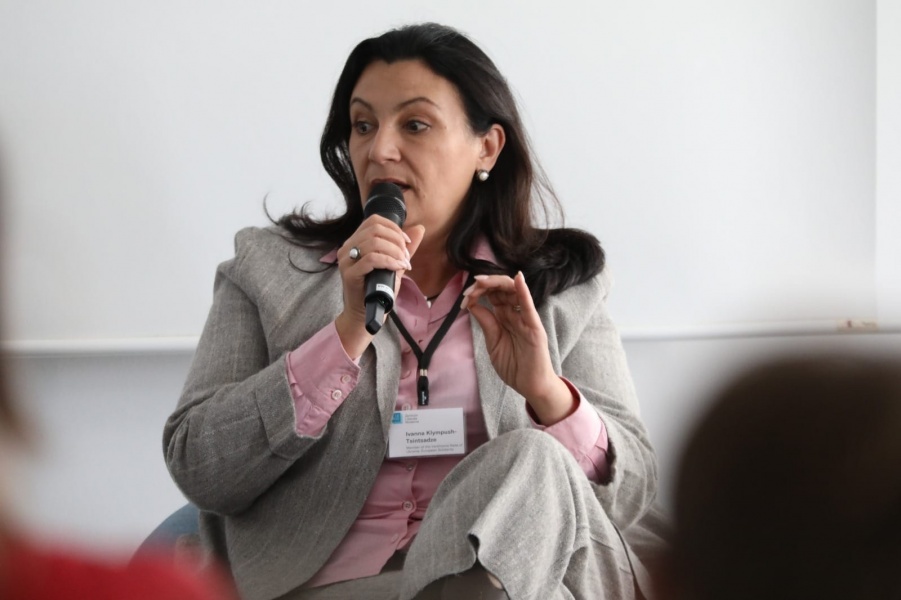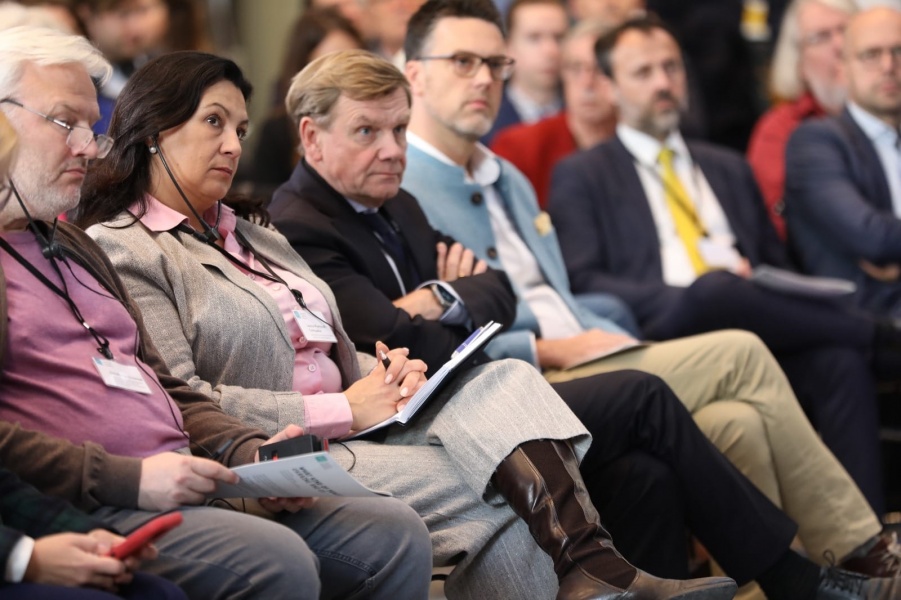
Chairwoman of the Committee on Ukraine’s Integration into the EU Ivanna Klympush-Tsintsadze took part in a conference of the Center for Liberal Modernity think tank in Berlin. The conference was dedicated to the war in Ukraine and the search for peace. Ivanna Klympush-Tsintsadze spoke during a panel discussion on democracy and the ongoing war in Ukraine.
Ivanna Klympush-Tsintsadze stressed the importance of holding such events in Germany, as they help keep Ukraine’s needs on the international agenda: “I am grateful to have such reliable and valuable friends in Germany who continue to do everything possible and impossible to clearly define priorities, to talk about what we are fighting for, what the stakes are in this war, and how Ukraine and the world should respond to these challenges.” The conference brought together representatives of various political forces in Germany, mainly from the current government and the opposition. “They understand that we are facing far greater challenges than just the war in Ukraine. Russia is waging war against the entire free world. And they understand that this requires raising awareness and communication with German citizens,” said the Chair of the Committee.
Klympush-Tsintsadze highlighted several misconceptions of the West. First, the assumption that it is not at war with Russia. Russia openly declares itself at war with the West. Second, the West mistakenly believes that this is a war for land. In reality, it is a war to change the world order. “I reminded everyone of Putin’s message in December 2021 stating that he wants to return to the borders of 1997, which means that this is not a question of land and territory. Any occupied settlement, even the smallest village, will be used by Russia as a springboard for future offensives. This reflects a complete disregard for international law and demonstrates that Russia seeks to prove that the borders of any free state can be changed by force,” said Ivanna Klympush-Tsintsadze. Third, she argued, the West still believes that compromises with the Russian Federation are possible. “I have déjà vu with 2022, when no one believed Ukrainians would hold out for three days or two weeks. Everyone was preparing to help the Ukrainian partisans. Now, once again, we see this examination — who is winning and whether it is worth investing resources to help Ukraine. These are generally unacceptable things,” the Chair of the Committee emphasised. She called for an end to the discussion about “red lines” in imaginable negotiations with Russia, emphasising that Russia has no plans for negotiations. It simply wants to change the world order and prove that it will continue to change borders by force. “It is not only a question of how Ukraine will come out of this war. This will have very serious consequences for the whole world. And we must abandon illusions about possible compromises with Russia,” said the Committee Chair. She reaffirmed that the only effective peace guarantee not only in Ukraine but also on the entire continent is Ukraine’s membership in NATO. Rather than pursuing illusory compromises with the Russian Federation, the focus should be put on developing a clear plan for Russia’s defeat and Ukraine’s accession to the Alliance.

Speaking about democracy in wartime, Ivanna Klympush-Tsintsadze noted that war definitely creates threats and risks. “Democracy inevitably faces restrictions during military actions. They are justified, but a balance is needed that will not allow the restrictions to cross the line,” said the Committee Chair. She stressed that Ukraine operates within the legal framework, and it is important not to exceed the limitations set by law. Going beyond those limitations, warned Ivanna Klympush-Tsintsadze, would weaken the country and society. “Despite this brutal war, the greatest threat to Ukraine is the loss of stability and unity in society,” the Chair of the Committee noted. She is also convinced that European integration is the magnifying glass that can help Ukraine restore lost rights and freedoms. “We thought that we had already gained them during the Revolution of Dignity, that we had defended them. But, unfortunately, today they are again under threat. I hope that European integration will allow us to keep them in focus and develop our progress,” Ivanna Klympush-Tsintsadze concluded.
Ivanna Klympush-Tsintsadze stressed the importance of holding such events in Germany, as they help keep Ukraine’s needs on the international agenda: “I am grateful to have such reliable and valuable friends in Germany who continue to do everything possible and impossible to clearly define priorities, to talk about what we are fighting for, what the stakes are in this war, and how Ukraine and the world should respond to these challenges.” The conference brought together representatives of various political forces in Germany, mainly from the current government and the opposition. “They understand that we are facing far greater challenges than just the war in Ukraine. Russia is waging war against the entire free world. And they understand that this requires raising awareness and communication with German citizens,” said the Chair of the Committee.
Klympush-Tsintsadze highlighted several misconceptions of the West. First, the assumption that it is not at war with Russia. Russia openly declares itself at war with the West. Second, the West mistakenly believes that this is a war for land. In reality, it is a war to change the world order. “I reminded everyone of Putin’s message in December 2021 stating that he wants to return to the borders of 1997, which means that this is not a question of land and territory. Any occupied settlement, even the smallest village, will be used by Russia as a springboard for future offensives. This reflects a complete disregard for international law and demonstrates that Russia seeks to prove that the borders of any free state can be changed by force,” said Ivanna Klympush-Tsintsadze. Third, she argued, the West still believes that compromises with the Russian Federation are possible. “I have déjà vu with 2022, when no one believed Ukrainians would hold out for three days or two weeks. Everyone was preparing to help the Ukrainian partisans. Now, once again, we see this examination — who is winning and whether it is worth investing resources to help Ukraine. These are generally unacceptable things,” the Chair of the Committee emphasised. She called for an end to the discussion about “red lines” in imaginable negotiations with Russia, emphasising that Russia has no plans for negotiations. It simply wants to change the world order and prove that it will continue to change borders by force. “It is not only a question of how Ukraine will come out of this war. This will have very serious consequences for the whole world. And we must abandon illusions about possible compromises with Russia,” said the Committee Chair. She reaffirmed that the only effective peace guarantee not only in Ukraine but also on the entire continent is Ukraine’s membership in NATO. Rather than pursuing illusory compromises with the Russian Federation, the focus should be put on developing a clear plan for Russia’s defeat and Ukraine’s accession to the Alliance.

Speaking about democracy in wartime, Ivanna Klympush-Tsintsadze noted that war definitely creates threats and risks. “Democracy inevitably faces restrictions during military actions. They are justified, but a balance is needed that will not allow the restrictions to cross the line,” said the Committee Chair. She stressed that Ukraine operates within the legal framework, and it is important not to exceed the limitations set by law. Going beyond those limitations, warned Ivanna Klympush-Tsintsadze, would weaken the country and society. “Despite this brutal war, the greatest threat to Ukraine is the loss of stability and unity in society,” the Chair of the Committee noted. She is also convinced that European integration is the magnifying glass that can help Ukraine restore lost rights and freedoms. “We thought that we had already gained them during the Revolution of Dignity, that we had defended them. But, unfortunately, today they are again under threat. I hope that European integration will allow us to keep them in focus and develop our progress,” Ivanna Klympush-Tsintsadze concluded.
More posts by topic
“News”
24 November 2025 13:08
20 November 2025 16:14
18 November 2025 12:57
13 November 2025 12:34
12 November 2025 12:31
09 November 2025 12:27
17 October 2025 16:54
15 October 2025 16:52
13 October 2025 16:50
10 October 2025 16:47